|
|
Belgian
pianist returns to Lincoln Sept. 12
By Tom Ineck
"The
1998 Jazz in June series ended with the spectacular American
debut of Belgian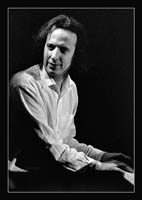 pianist." pianist."
Thus began my Lincoln Journal-Star
review of Paduart's last Nebraska appearance.
When he returns
Sept. 12 for a 7:30 p.m. performance at
P.O. Pears (one of several upcoming shows
funded by the Berman Music Foundation), it
promises to be a similarly stellar
occasion--and a bit of deja' vu.
Yes, Paduart is four
years older and has released three more
CDs since his first visit to the States,
but his lush, romantic piano style still
contains echoes of his most obvious
influences, from Bill Evans and Fred
Hersch to classical impressionists Claude
Debussy and Maurice Ravel. And, he will be
accompanied by the same longtime Kansas
City rhythm section of bassist Bob Bowman
and drummer Todd Strait, who recently
relocated to Portland, Ore.
Bowman and Strait
proved their thorough musicianship by
doing justice to Paduart's often difficult
pieces just hours after meeting the
composer, I wrote of the trio's first
concert collaboration. The up-tempo opener,
"Steps in the Snow," was a good example of
the trio's ability to lock into a groove
and expand on the chord
changes.
The pianist also is a
composer of great range and ability, from
beautiful ballads such as "Precious
Moments" and "Billet Doux" to the
harmonically adventurous "Thinking of
You," the 1998 performance of which I
described as "reminiscent of McCoy Tyner's
two-fisted keyboard style." Paduart
embellished with lyrical flourishes and
grand chords without sounding grandiose.
The Brussels native
began classical piano training at age 10,
made his first attempts at improvisation
on trumpet a little later and discovered
jazz at age 17. But it was a master class
with Michel Herr (then pianist with
harmonica virtuoso Toots Thielemans) that
convinced him to pursue jazz
full-time.
Since 1996, Paduart's
focus has been almost exclusively on the
trio format, resulting in the CD Clair
Obscur, his tribute to pianist and
composer Fred Hersch. His 1998 recording
Belgian Suites features Malach, and
the following recording, True Stories,
features saxophonist Charlie Mariano. Last
year, he returned to the trio format for
Trio Live and toured Sweden,
Denmark, Norway, Switzerland, France,
Italy, Netherlands, Luxembourg, and
Belgium with guest saxophonist Rick
Margitza.
In addition to its
Sept. 12 appearance at P.O. Pears in
Lincoln, Paduart's trio also has booked
engagements Sept. 13 at the Blue Room in
Kansas City, Mo., Sept. 14 in Ottumwa,
Iowa, and Sept. 15 in Topeka,
Kan.
On Oct. 10, the
Westport Art Ensemble of Kansas City
appears at P.O. Pears with its unique and
progressive jazz sound. It regular members
are bassist Gerald Spaits, saxophonist
Josh Sclar, guitarist Jake Blanton,
keyboardist Roger Wilder and drummer Todd
Strait.
As Butch Berman wrote
in the last edition of Jazz, after
catching the ensemble at the Blue Room in
Kansas City: "Comprising a repertoire that
extends from Ornette to the Byrds (a
tremendous rendition of "Eight Miles
High") plus originals, this truly is a
band to watch-definitely the best new band
in K.C." 'Nuff
said.
On Dec. 5, Kansas
City's Doug Talley Quartet will take the
stage at P.O. Pears, performing selections
from saxophonist Talley's latest release,
Kansas City Suite, an ambitious project
that takes the listener on an historic
tour of the Midwest ìCity of
Fountains.
The recording primarily
pays tribute to the fabulous era of the
1920s and 1930s, when Kansas City was
making music history and political boss
Tom Pendergast was peddling influence with
a vengeance.
Kansas City Suite
begins with a geography lesson called
"1600 E. 18th St.," where the Blue Room
jazz club now occupies the famous corner
of 18th and Vine. "City of Fountains" has
a more pastoral mood, like a stroll
through one of Kansas City's many parks on
a warm, sunning afternoon. The beautiful
ballad "The Sleeping Child" refers to one
of the many sculptures in the Country Club
Plaza, while the frantic-paced "The Buck
Stops Here" refers to the famous pledge by
favorite son Harry S. Truman.
The other members of
Talley's working quartet are pianist Wayne
Hawkins, bassist Tim Brewer and drummer
Keith Kavanaugh.
top
|
Sons of Brasil brought exotic sounds from K.C.
|
|
By
Tom Ineck
Lincoln's
2002 Jazz in June series, sponsored in
part by the Berman Music Foundation,
began June 4 with a high-spirited performance by
the six-piece Sons of Brasil, who brought
the exotic rhythms of Brazil via Kansas
City, Mo., the group's hometown.
Trumpeter
and leader Stan Kessler also is the band's
most technically proficient and
imaginative instrumentalist. Beginning on
flugelhorn, he dominated the breezy opener,
"Amazonas," from the Sons' CD of the same name.
"Aquarela do Brasil (Watercolors of Brazil),"
by Ary Barroso, is a melody familiar to fans of
Brazilian music and was expertly handled by Kessler
on trumpet.
Again
switching to flugelhorn, Kessler caressed
the samba "Home Alone," which also
featured a nice guitar solo by Jake
Blanton, sitting in for regular band member
Danny Embrey. Kessler's wonderful technique was
perhaps best displayed on Caetano Veloso's "Partido
Alto," a rhythmically challenging piece on which
he flawlessly negotiated a bravura trumpet
solo with rapid fingering and excursions
into the horn's upper range.
Hermeto
Pascoal's "Cha de Panela" had a punchy,
driving beat shared by percussionists Gary
Helm and Doug Auwarter and punctuated with
solos by Kessler on trumpet, Roger Wilder
on piano and Blanton on guitar. "It Is," a
samba with a political message about human
rights, was beautifully stated by Kessler on flugelhorn
and Wilder on piano, who recently joined the
Sons of Brasil as a permanent member replacing
keyboardist Wayne Hawkins.
Kessler's own "Demons" was written about the
area known as Bahia. After Kessler stated the
melody on trumpet, Wilder elaborated with
some exotic synthesizer effects on the
electronic keys. The trumpet solo that
followed was hard-charging and strongly
imbued with the blues.
The
flugelhorn, guitar and piano all got solo
statements on "Know It All." Kessler again
shone on trumpet throughout "Casa Forte,"
an uptempo bossa nova composed by Edu Lobo
and named for a Brazilian beach resort.
Kessler swings with confidence at any speed.
The
Sons revived the evergreen Jorge Ben
composition "Mas Que Nada," best known for
the '60s hit by Sergio Mendes and, more
recently, the retro Austin Powers movie.
This version was true to the original while
avoiding the ever-present parody. Likewise with
Jobim's overdone "The Girl From Ipanema." Kessler's
imaginative arrangement created stark, contrasting
harmonies between the guitar and
flugelhorn in a unique approach.
Kessler
added brassy, virtuosic flourishes to the
catchy "Done Deal" before the band
finished with the trumpeter's composition
"Mountain Vista," an upbeat samba with a
wonderful percussion section and, again, notable
trumpet melody.
Jazz
in June's 11th season opening concert drew a
large and diverse audience, estimated at
more than 2,000 in the large green spaces
near Sheldon Memorial Art Gallery on the
University of Nebraska-Lincoln city
campus.
|
top
|
Cables concert is 2002 live jazz highlight
|
|
By Tom IneckThere never was
any doubt that the June 11 performance by the George
Cables Trio would be Lincoln's live jazz highlight
of the year, and the year wasn't even half
over.
Accompanied by bassist Cameron Brown
and drummer Victor Lewis, Cables appearance for
the Jazz in June outdoor concert series was highly
anticipated and lived up to the high
expectations. The Berman Music Foundation
sponsored the concert.
The trio mixed standards
with originals, straight-ahead jazz with Latin
numbers, and ballads with up-tempo barnburners
for a totally satisfying evening of
music.
Cables gave the Latin
tinge to an up-tempo "All or Nothing at All," spinning
off endless variations on the familiar theme.
Lewis' drum breaks were sheer artistry in rhythm.
"Spookarella," a Cables original, floated
along at a mid-tempo, modified waltz time
before lurching into a lumbering gait that
indicated the composer's quirky sense of
humor. Brown displayed his original voice
on a powerful bass solo, and Lewis
delivered a patented drum barrage.
Next up
was Cables' most familiar composition, the
bright, affectionate and loving "Helen's
Song," which the composer modestly claimed
was "written out of guilt." Embellishing
the guilt theme, he introduced "Helen's
Mother's Song" with a solo piano introduction,
followed by complex changed and intricate harmonies.
Instead of
its usual ballad tempo, "Autumn in New
York" was given an uptempo treatment with
an Afro-Cuban underpinning. Brown's solo
was virtuosic - simultaneously daring,
aggressive and lyrical. The soulful gospel-tinged
ballad "Will You Still Love Me Tomorrow" received
a gorgeous, sensitive reading by Cables and
company.
Halfway
through a mid-tempo version of "I Thought
About You," Cables cleverly inserted a
quote from Monk's "Little Rootie Tootie."
His take on "I Should Care" was a contrapuntal
tour de force.
For his
solo piano interpretation of Monk's "Round
Midnight," Cables displayed his broad
knowledge and grasp of jazz piano history,
even including an extended stride passage.
His "Senorita de Aranjuez" was a lovely tribute
with a Spanish flair.
"Doxy," a
familiar jazz melody penned by Sonny
Rollins, was followed by the capper, a
very fast rendition of Freddie Hubbard's
"Intrepid Fox," with a surging drum solo by
Lewis.
With his
self-effacing comments, gracious demeanor
and astounding keyboard technique, Cables
dazzled the audience of nearly 4,000 who
turned out to fill the sculpture garden at
the Sheldon Memorial Art Gallery.
For a
pianist of such stature, accompanists of
equal ability are hard to find, but Brown
and Lewis more than fit the bill. Together,
the trio operates as a unit and forms one of
the great collaborations in jazz today.
|
top
|
Paris and San Francisco meet in Lincoln
|
|
By Butch Berman
It seemed like Paris in Lincoln via
San Francisco June 18 at the third in a series
of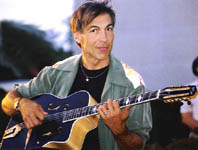 acts that
the Berman Music Foundation brought
in for the Jazz in June series this season.
acts that
the Berman Music Foundation brought
in for the Jazz in June series this season.
We booked
the sensational Hot Club of San Francisco
at the Zoo Bar back in October 1995, when
we had a few collaborations with Lincoln's
famed blues bar. Paul Mehling, originator
of these talented cats, made an indelible
impression on a lot of folks, including me,
back then-so it was a thrill for me to have the
Jazz in June committee's approval for this group.
After more
than a decade in the biz, Paul's concept
of putting together a revolving band of
players who dig Django Reinhardt, Stephane
Grappelli and the premier Hot Club of
France of the '40s has succeeded wildly with
every configuration that I've caught between
here and California. All the performances and
CDs are A+ #1.
This
year's participants were Paul Mehling,
leader, guitar and vocals; Robert Thompson,
violin; Ari Munkres and David Ricketts, rhythm
guitars; and Louis Matthee, bass.
Paul, as
always, was on top of his game with his
off-center quips directed toward the
bemused throng of folks, beautiful articulated
vocalizing and of course, his outstanding chops
on the guitar. The entire group smokes behind
him, with all members doing their best to recreate
the mammoth rhythm sound behind Django and
with violinist Thompson hanging in all the
way with Paul. Stephane Grappelli would
have been proud. You never miss drums as
the rhythm section churns behind the two
soloists, swinging like crazy.
They
performed nearly 20 tunes within two sets
that gorgeous night, including their takes
on "The Man I Love," "Djangology," Gerry
Mulligan's "Limelight," Chick Corea's "Armandoís
Rhumba," and several originals. Their new CD,
Claire de Lune, is a
gas, so check it out. (For a review of the CD,
visit the BMF website.) It was
truly another night to remember. To Django
Reinhardt and Stephane Grappelli, rest in
peace.
|
top
|
Dave Pietro band delivers Wonderful concert
|
| By Bill Wimmer
Saxophonist Dave
Pietro brought his group to Lincoln for the
Jazz in June series
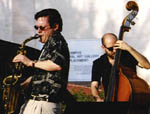 June 25.
June 25.
Pietro, a
very talented musician, composer and
arranger, came with an excellent group
featuring David Berkman on piano; Pete McCann,
guitar; John Hebert, bass; and Nasheet Waits
on drums. Most of the music was from Pietro's
latest recording, Standard Wonder: The Music
of Stevie Wonder, and the music benefited from
McCann and Berkman's presence from the
recording and their comfort with Pietro's
often tricky arrangements.
Opening
with Wonder's "Another Star," the group
fell into a "Nardis'-style vamp that set up
a swinging and refreshing take on the tune. Pietro
displayed complete authority on the horn with
a fat tone, interesting lines and rythmic intensity.
He will be one to watch in the next couple of
years.
Berkman took off
with a two-fisted keyboard foray and there was
a nice exchange with drummer Waits at the end
of the tune. "Smile, Please" was next, highlighted
by McCann's interplay on the melody with Pietro
and a very tasteful guitar solo for McCann, who
was an excellent foil for Pietro all night
long.
The group then launched into
Wonder's "Go Home," replacing the original throbbing
funk with a relaxed shuffle feel. The melody again
featured McCann playing with Pietro, this
time exploring the harmonies of the song
and finding new textures in it. "The Seen
between Two Unseens," a Pietro original,
followed, featuring a hot groove from
Waits and a very solid bass solo from Hebert.
"The
Secret Life of Plants" opened with an
intense, chordal rythmic solo by Berkman,
fueled by drummer Waits. Pietro followed
with one of his best solos of the evening-a
probing, searching ride with a lot of turbulence.
The song ended with an incredible fade-out vamp
with great group interplay that prompted Petro's
comment, "Miles Davis used to say that sometimes
the best music is in the vamp." The band
finished with "Happier than the Morning
Sun," another Wonder song given a very
interesting treatment, and a nice ending
to a wonderful show, in spite of the less
than ideal conditions of Jazz In June.
Without
trying to sound like I have a complaint
with the crowd in every review I do, I
must say that a group like this that plays
such intricate arrangements with such
skill as these guys deserves a lot better
than the very casual listeners at these concerts.
Jazz In June has become more of a social
event than a music event, where it seems
more important to speak above the rest of
the crowd than it does to pay attention to
the music on stage. A group like Pietro's
or George Cables', playing really demanding
music at these shows, needs to be heard by more
than the 100 people directly in front of the
stage, but at these shows it's hard to hear what's
going on in the back with all of the crowd
noise. There were even boomboxes spotted
in the back this year!
That being
said, there is so little major-league jazz
at the Lied Center or anywhere else in
Lincoln this year that any exposure to a
group like Dave Pietro's is a special
treat. I want to thank the Jazz in June committee
for a strong series this year and a note of thanks
to University of Nebraska-Lincoln trumpet instructor
Darryl White for bringing in Dave Pietro's band,
a very fine group featuring some of the
best young players on the scene
today.
|
top
|
Teen Djangirov continues to improve with "age"
|
|
By Tom Ineck
Eldar Djangirov, the 15-year-old
jazz piano marvel from Kyrgyzstan, is aging
with a combination of youthful grace and
prodigious talent.
His
appearance May 16 in Lincoln as guest
soloist with the Nebraska Jazz Orchestra
was sponsored in part by the Berman Music
Foundation and marked the sixth Djangirov performance
I've witnessed in the last five years (number
seven was at the Topeka Jazz Festival, also reviewed
in this issue of Jazz). He continues to impress
this listener with his growing knowledge of
jazz history and his astounding keyboard
technique.
Before the
young prodigy took the stage, the NJO blew
the cobwebs out of the horns with a shot
of "Double Barrel Blues," a Bob Florence
tune with an odd blues pattern modulating
between two keys. "Tiptoe," composed by
Thad Jones, is another in the endless list of
tunes based on the changes of Gershwin's "I Got
Rhythm." Bob Krueger delivered a flawless solo
on muted trumpet, and the trombone section and
bassist Andy Hall expertly negotiated the
difficult changes of a unison
solo.
Mark
Benson's nostalgic ballad "Sauk Valley
Memories" featured the composer on soprano
sax, pianist Tom Harvill and a lush brass
arrangement that utilized four flutes. "Courage"
is the second part of a three-part suite by longtime
NJO contributor Rex Cadwallader. Krueger took
off on some nice flights of fancy in the
groove-heavy tune revolving around a
trumpet-bass dialogue.
The first
set ended with "There's the Rub," a funky
number with ample solo spots for Ed Love
on alto sax, Darren Pettit on tenor sax
and Hall on a rapid-fire electric bass
excursion.
As if to sneak up on
his listeners, Djangirov began with an
understated solo ballad rendition of the
classic "All the Things You Are." Lush
arpeggios segued to a very rhythmic section,
which accelerated to bop tempo before returning
to ballad time with classical
flourishes.
Hall on bass and Greg Ahl on drums joined
Djangirov for another familiar ballad,
"Body and Soul." It was with "Lester Leaps
In," however, that the pianist finally
took off on a blazing keyboard showpiece,
with echoes of Errol Garner, Oscar Peterson
and, especially, the godlike Art Tatum - pretty
heady company for a teenager from the former
Soviet Union.
In the
final set, Djangirov showed his
familiarity with big-band blues on Neil
Hefti's "The Kid From Red Bank," dedicated to
Hefti's employer at the time, Count Basie. For
a change of pace, the NJO launched into "Upa Neguinho,"
a breezy mid-tempo Brazilian tune by Edu Lobo.
Djangirov contributed some amazing
flourishes perfect for the lighthearted
beat.
Another
Thad Jones favorite, "A Child Is Born,"
received a lush treatment, building from
solo piano, with Hall adding bass and Ahl
adding brushes before the full band entered
with a breathy, five-flute arrangement. "Swingin'
For the Fences," based on "Sweet Georgia Brown,"
offered solo opportunities for trombonist Bryan
Scott, tenor saxophonist Rich Burrows,
guitarist Peter Bouffard and Djangirov,
who took it out swinging furiously for his
audience of 500 adoring fans.
|
top
|
Topeka Jazz Fest was a piano-lover's dream
|
| By Tom Ineck
The 2002 Topeka Jazz Festival was a
piano-lover's dream come true, with half a
dozen world-class keyboard players on the
bill. Much of the remainder of the 5th
annual event, however, felt like deja vu--many of the same predictable
tunes and many of the same artists from years
past.
That
doesn't necessarily mean the May 25-27
festival was a disappointment. But, with
few exceptions, this year's edition didn't
generate the level of excitement to which
festival veterans had become accustomed.
Among the exceptions
was the Bill Charlap Trio, which generated enough
electricity in the crowd to power all of Topeka
for the next year. Charlap clearly established
himself as a pianist apart from all others, in
a league of his own, despite the festival's
overall strength in that area. Joined by
his longtime bandmates - bassist Peter
Washington and drummer Kenny Washington -
Charlap turned the standards on their
heads, executing them with precision and
improvisational skill while remaining true to
their mood and melody.
Other festival debuts
worthy of note were those of trumpeter Terell
Stafford, trombonist Wycliffe Gordon and bassist
Jennifer Leitham. What follows are some of the
highlights of the 2002 Topeka Jazz
Festival, which was partially funded by
the Berman Music Foundation.
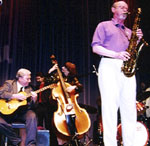 It
all began with an impressive set fronted by
returning artist Ken Peplowski on tenor
sax and clarinet, joined by trumpeter Mike
Bennett, trombonist Dan Barrett, pianist
Joe Cartwright, bassist Gerald Spaits and
drummer Todd Strait. In his Topeka debut,
Bennett demonstrated an expressive and brassy
style and a rapid-fire fingering technique on "Moten
Swing" and an uptempo version of "My Buddy." He
switched to flugelhorn for "In My Solitude."
It
all began with an impressive set fronted by
returning artist Ken Peplowski on tenor
sax and clarinet, joined by trumpeter Mike
Bennett, trombonist Dan Barrett, pianist
Joe Cartwright, bassist Gerald Spaits and
drummer Todd Strait. In his Topeka debut,
Bennett demonstrated an expressive and brassy
style and a rapid-fire fingering technique on "Moten
Swing" and an uptempo version of "My Buddy." He
switched to flugelhorn for "In My Solitude."
Leitham
was making one of her first appearances
since she switched from John to Jennifer,
but the flamboyantly dressed bassist soon
dispelled any possible tension in the
audience with her astounding technique and
ingratiating good humor. Accompanied by pianist
Russ Long and drummer Joe Ascione, she played
a highly articulated lead on "I Thought About
You," followed by a wonderful version of "Manha
da Carnaval (A Day in the Life of a Fool)," from
"Black Orpheus." Her bass solo was profound and
virtuosic.
Thanking
festival organizers, Leitham said she was
"flattered to be asked to come even after
my life changes." On posters for the
festival that were printed last year, she
was billed as John Leitham, a name familiar
to fans of Mel Torme, with whom the bassist played
and recorded extensively over the last decade
of the singer's towering career.
But
the nicest touch of all was Leitham's
introduction to the next tune, a solo bass
medley of "Out of This World" and the Joni
Mitchell song "All I Want." Declaring
herself a big Mitchell fan, she said, "I
could do "Both Sides Now", but that would be
a little too obvious." Her performance combined
a free, lyrical improvisation with dark harmonies,
powerful chords and percussive hand slapping.
After
establishing her own abundant talents,
Leitham allowed more space for her
accompanists on "What Is This Thing Called
Love" and "Isn't It Romantic?" on which
she expertly stated the melody on bowed bass.
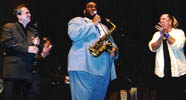 In
her second visit to the Topeka fest, singer
Rebecca Parris again proved herself an
extraordinary vocal stylist and consummate
show woman. She soared on "Autumn Leaves,"
delivered the ballad "Crazy He Calls Me"
with dramatic flair and riffed hilariously
on "When Sunny Gets Blue." Scolding the song's
protagonist for her negative attitude, she inserted
her own pointed commentary: "I'm bored with her
blues. Change your name or get a life.
Revoltingly blue. Boringly blue." She
introduced "Don't Go to Strangers" as "a
co-dependent's theme song, "and exhibited
an impressive vocal range on "Do Nothing 'Til
You Hear From Me."
In
her second visit to the Topeka fest, singer
Rebecca Parris again proved herself an
extraordinary vocal stylist and consummate
show woman. She soared on "Autumn Leaves,"
delivered the ballad "Crazy He Calls Me"
with dramatic flair and riffed hilariously
on "When Sunny Gets Blue." Scolding the song's
protagonist for her negative attitude, she inserted
her own pointed commentary: "I'm bored with her
blues. Change your name or get a life.
Revoltingly blue. Boringly blue." She
introduced "Don't Go to Strangers" as "a
co-dependent's theme song, "and exhibited
an impressive vocal range on "Do Nothing 'Til
You Hear From Me."
This
listener never tires of drummer Jeff
Hamilton's festival spots. This time, he
led a trio with pianist Tamir Hendelman and
bassist Christoph Luty, but there never was any
doubt who powers this threesome. Hamilton put
them through the paces on ìI Love Being
Here With You," "Lullaby of the Leaves" and "Too
Close For Comfort." His brushes sizzled
like rattlesnakes on Luty's arrangement of
"C Jam Blues," and on "Felicidad" he
ranged from hand drumming to wire brushes
to sticks to knuckle raps and back to hands
for a polyrhythmic effect.
Festival
veterans John Clayton on bass and brother
Jeff Clayton on sax led their quintet
through a stunning set dedicated to Duke
Ellington, including "Don't Get Around Much
Anymore," "Love You Madly," "Caravan," "Take
the 'A' Train" and "Perdido." The rest of this
stellar group consists of trumpeter Terell Stafford,
pianist Bill Cunliffe and drummer Jeff
Hamilton, assuring that the unit runs with
the precision of a well-oiled machine.
Trombonists
Dan Barrett and Wycliffe Gordon squared
off fronting a sextet that included Ken
Peplowski, Joe Cartwright, bassist Jay
Leonhart and Todd Strait. It soon became
clear that Gordon's prodigious tone, triple-tonguing
technique and skill with a plunger overshadowed
even Barrett's considerable talents on "And the
Angels Swing," "Mood Indigo" and
"Cottontail."
Our first
opportunity to hear the Charlap trio came
at 11 p.m. the first night, when they
opened with John Carisi's "Israel." Cole
Porter's "All Through the Night" was an
uptempo showcase for Charlap's powerful arpeggios,
filigreed, lyrical lines and astonishing facility.
On "Roundabout," he phrased the piano melody
and dynamics like a first-class vocalist.
The trio
proved itself a real band on "The Lady is
a Tramp," stopping on a dime and
restarting with flawless ease at a hot tempo.
Charlap delivered an incredible impressionistic
and explorative solo on "Where or When," and
the fast-shifting keys and notes seemed to fall
naturally - and magically - beneath his fingers
on "My Shining Hour." The Charlap nightcap left
the audience stunned, but supremely
satisfied.
Charlap
and pianist Ted Rosenthal paired up Sunday
morning for a set that included Monk's
"Let's Cool One" and Parker's "Au
Privave," with help from Charlap's rhythm section.
It was obvious that the two pianists have played
piano duos before, and they are especially compatible
in this challenging format.
Trumpeter
Terrell Stafford stole the show in a set
led by drummer Joe Ascione and also
featuring trumpeter Mike Bennett, pianist
Joe Cartwright, guitarist Bucky Pizzarelli
and bassist Jay Leonhart. Cartwright was nicely
showcased on a Latin-tinged "Body and Soul,"
but it was Stafford's bravura style on "Sweet
Georgia Brown" and powerful, growling solo on
"In A Mellotone" that set him apart from
Bennett's stiffer, more academic
approach.
In a
Sunday evening set, Parris and a rhythm
section of K.C. stalwarts put some nice
spins on the familiar standards "If You
Could See Me Now," "Day In, Day Out" and "Angel
Eyes," which was taken at a very fast tempo after
the singer explained that the mood is different
today than when the ballad of lost love was written
in 1940. "In 2002, I'm pissed off," she
bellowed.
Parris
has near-perfect intonation, as she proved on
"You Don't Know What Love Is," done with a
samba beat. For the ballad "What Can I
Say?" she invited pianist Bill Charlap to
join her in a duet that perfectly married
their sense of confidence, their care in
enunciating every note and word and their
flair for dramatic effect. Scatting from the
get-go, Parris finished with a full-tilt take
on "Billie's Bounce."
The
Clayton Brothers Quintet returned with a
set leaning heavily on original tunes, including
the funky John Clayton composition "Choose Me,"
and Jeff Clayton's uptempo "Runway" and his lovely
ballad "Entre Vous." They also did justice
to a couple of standards, "I've Never Been
in Love Before" and Johnny Mandelís
ballad "Emily." Pianist Bill Cunliffe's
playing was especially tasteful on the
slower tunes.
Pianist
Eldar Djangirov's appearance on the final
day of the festival has become a
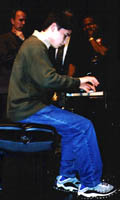 much-anticipated tradition, since he first
performed a short solo set at age 11 in
1998. At 15, joined by bassist Gerald
Spaits and drummer Todd Strait, he continues
to amaze with his fluency in a variety of styles
and tempos.
much-anticipated tradition, since he first
performed a short solo set at age 11 in
1998. At 15, joined by bassist Gerald
Spaits and drummer Todd Strait, he continues
to amaze with his fluency in a variety of styles
and tempos.
A very slow version
of "You Don't Know What Love Is" was followed
by a wildly uptempo "Lester Leaps In." Mulgrew
Miller's "Song For Darnell" seemed an unusual
choice for a set that was otherwise filled with
jazz evergreens, but it was a beautiful take
on the mid-tempo waltz. The trio finished
with "You and the Night and the Music" and
Dizzy Gillespie's "Con Alma" featuring
Strait moving from sticks to brushes,
adding all the right rhythmic colors to
the musical canvas.
Strait's move from
Kansas City to the Northwest was announced during
the festival, a loss that will certainly be felt
throughout the K.C. area and in booking next year's
Topeka fest. Strait's power and versatility have
been incalculable assets in the event's
five-year history.
One of the chief
disappointments of the 2002 festival was the dated,
sappy Monday afternoon performance by vocalist
Lynn Roberts. In a flashy, show-biz style that
has more in common with vaudeville and Vegas than
with jazz, she belted out "Til the Sun Comes
Out," "Let's Get Away From It All," "East
of the Sun (West of the Moon)," "Sunny
Side of the Street" and the Mickey Mouse
tune "Music Is My Best Friend."
Roberts may be a
symptom of a festival in artistic decline. Event
organizers bemoan the absence of local residents,
yet they ignore booking options that might entice
them. There is plenty of fertile ground
for growth without pandering to an aging
audience or surrendering to artless pop
trends.
After the
Roberts fiasco, the Jeff Hamilton Trio
restored our faith with a strong dose of
straight-ahead jazz. Milt Jackson's bluesy
"Yano" was followed by Hamilton's arrangement
of the medley "Isn't It Romantic" / "Serenade
for Strings," on which the drummer phrased the
melody with brushes. His dancing hands, effortless
timekeeping and strategically placed kicks
to the bass drum created a rhythmic
minefield on "I Didn't Know What Time It
Was."
Luty recreated the droning sound of a Scottish
bagpipe while Hamilton's fingers rapped
out a tattoo on the snare drum to lend
authenticity to "Hamilton House," a
Scottish folk tune. The trio took a fast-paced,
convoluted path through Monkís difficult
"Rhythm-n-ning." Tamir Hendelman hammered out
single-not piano runs and deftly shifted directions,
then Hamilton abruptly changed tempos
during a furious solo on brushes.
In a
moving tribute to the tragic events of
Sept. 11, 2001, the trio played an
original, unnamed ballad that quoted the melody
to "we are poor little sheep who have lost our
way."
The
Clayton Brothers Quintet again highlighted
its own compositions and arrangements, in
contrast to the festival's unwritten
policy that artists play familiar tunes. It's
too bad that John Clayton felt it necessary to
explain the importance of continuing the jazz
tradition with new music for a new millennium.
Music that is as good as the Claytons' music justifies
itself.
Jeff
Clayton contributed "Back in the Swing of
Things" and a wonderful arrangement of
Horace Silver's "Song For My Father,"
while John Clayton penned the impressionistic
ballad "Next Time" and the uptempo trumpet feature
"Blow Your Horn."
In a
novelty set that often sounded like a
swarm of killer bees, seven bass players
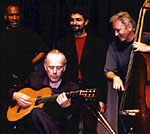 gathered on stage. The specially selected
music ranged from Gerald Spaits'
arrangement of "Don't Get Around Much
Anymore" to the Andy Simpkins tribute "Walkin'"
to Bob Bowman's "Basses in the Belfry" to John
Clayton's moving arrangement of a Chopin
prelude.
gathered on stage. The specially selected
music ranged from Gerald Spaits'
arrangement of "Don't Get Around Much
Anymore" to the Andy Simpkins tribute "Walkin'"
to Bob Bowman's "Basses in the Belfry" to John
Clayton's moving arrangement of a Chopin
prelude.
For the
final appearance by the Bill Charlap Trio,
most of the other pianists were in
attendance, aware that it was a set not to
be missed. Charlap began with George Wallington's
"Godchild," then segued into "In the Still of
the Night," showing incredible dexterity at the
super-fast tempo.
His
rendition of "Blues Skies" displayed an
advanced concept that was - at the same
time - accessible, lyrical and imaginative.
"Blue Room" was taken at a caressingly slow tempo.
On the other hand, "Slow Boat to China" was anything
but slow. In Charlap's hands, it was a
hydrofoil skimming across the water and
taking listeners on an exhilarating
ride.
Pianist
Bill Cunliffe followed Charlap in a final
solo piano set, not an enviable position
to be in. Cunliffe handled it with humor
and class, playing "If I Only Had a Brain,"
Jobim's "How Insensitive" and a movement from
a piano concerto he wrote for his mother, which
contained echoes of Copland and folk melodies
like "Shenandoah." He then combined "Satin
Doll," "Eleanor Rigby" and "The 1812
Overture" for a hilarious fusion of vastly
different styles.
While
sponsorships for the fifth annual festival
were up, the number of people in the
audience did not grow as much as organizers
had hoped. Also, next year's lineup is weak by
comparison, with only a few new notables such
as pianist Joanne Brackeen, vibraphonist Peter
Appleyard, baritone saxophonist Claire Daly and
singers Tierney Sutton and Banu Gibson.
|
top
|
Tomfoolery
Project Object carries
on Zappa tradition
|
| By Tom Ineck
PETALUMA, Calif. - It is no surprise that
there is great music happening in classic,
restored movie theaters all over
America.
Boulder,
Colo., has the Fox Theater and the Boulder
Theater. Even in Lincoln, Neb., the recent
reopening of the former Stuart Theater as
The Rococo already has yielded hopeful signs
for a music demographic that usually gets short
shrift.
I mean the
audiences with more discerning tastes,
audiences too small for the stadium shows
and too big for the average club.
I mean
those folks with a more adventurous
spirit, willing and anxious to mix their rock
with rhythm 'n' blues, folk, classical and even
jazz music, perhaps all in the same evening.
Such was
the case at the quaint and beautiful
Mystic Theater in this northern California
town of 52,000 when Project Object came to
play the evening of June 23. I was half a continent
from home, and the prospect of hearing a Frank
Zappa cover band was intriguing. So, I headed
north from San Francisco as two dear friends headed
south from their home in Occidental to meet me
at the Mystic.
My
expectations rose to unrealistic heights
as I imagined a group of accomplished musicians
who could do justice to the complex, hilarious,
sleazy, profound, political, exasperating, dark,
puzzling, challenging, lyrical music of the master.
Zappa (1940-1993) was somewhat of a human
conundrum, and it was difficult to imagine
anyone capable of capturing his many moods
and contradictions.
I hoped for the best
and feared the worst. What we got was the best
imaginable.
No mere cover band, Project
Object captured the man, the myth and the music
without taking itself too seriously. There was
never any doubt that the seven band members were
having a blast playing and singing this
confounded music, and the mood was
contagious. The time signature changes
alone would have stymied most musicians,
but their execution was flawless.
I didn't take written notes
that night, but I did purchase the band's CD "Absolutely
Live" as a near-document of the performance.
Recorded live at Wetlands Preserve in New
York City on Aug. 5, 2000, it includes
nearly all the same players and many of
the same tunes we heard.
First, let's talk guitars. Zappa's fuzzy,
wah wah-drenched, rock-style noodling was
idiosyncratic in the extreme. Project
Object's three crack guitarists - Andre
Cholmondeley, Robbie "Seahag" Mangano and
Ike Willis - managed to echo his quirky approach
without copping his licks. When you get the CD,
check out Cholmondeley on "More Trouble Every
Day," Willis on "Filthy Habits" and Mangano on
"The Evil Prince."
Jordan Shapiro added Zappa-like
touches on Fender Rhodes piano and synthesizers,
while electric bassist Rick Bartow held down the
constantly shifting foundation and
inserted occasional sly solo statements.
Drummer Wes Paich did the impossible -
keeping the devilishly difficult time changes
while adding his own polyrhythmic flourishes.
In Project
Object, singing is a group activity with
everyone joining in along the way. But it
was guitarist Ike Willis and the great
Napoleon Murphy Brock - doubling on
saxophone - who carried most of the considerable
vocal burden. Zappa's lyrics are dense, cascading
in outrageous riffs and keeping pace with changing
tempos. Willis and Brock were downright playful
as they met the vocal challenge, whether
singing about raising dental floss in
"Montana," the crazy world of Washington
politics or that old "Cosmik Debris." |
top
|
|
 pianist."
pianist." acts that
the Berman Music Foundation brought
in for the Jazz in June series this season.
acts that
the Berman Music Foundation brought
in for the Jazz in June series this season.



